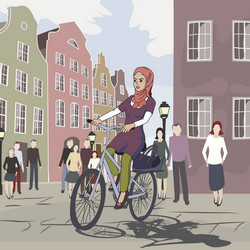Towards the inclusion of young adult immigrants
Backed by EU funding, the EUMARGINS (On the margins of the European community young adult immigrants in seven European countries) project was established to identify and prioritise the range of factors impacting the abilities of individuals and groups to transition from social exclusion to inclusion. A combined quantitative and qualitative approach enabled a comprehensive consideration of the complexity of the processes of inclusion and exclusion, as well as the transition from one to the other. Researchers interviewed 200 young migrants and descendants (aged between 18 and 26) on their experiences of inclusion and exclusion in school, work, their neighbourhood and city at large. The urban areas were Tallinn (Estonia), Metz/Nancy (France), Genoa (Italy), Oslo (Norway), Barcelona (Spain), Gothenburg (Sweden) and London (the United Kingdom). The overall aim was to determine what hinders their inclusion, and what can be done to help overcome the situation. Project findings have been published in a collection of books and policy briefs. The book 'Inclusion and Exclusion of Young Adult Migrants in Europe – Barriers and Bridges' explores the plight of migrants in contexts such as welfare states, old colonial countries and ex-communist countries. The book 'Young Migrants: Exclusion and Belonging in Europe' presents the life experiences of these young adults in terms of migration, work, education, civic participation and politics. Policy briefs include recommendations regarding inclusion and exclusion challenges of young adult immigrants in Europe. One brief focuses on immigration discourses in media and politics, and another addresses the consequences for inclusion and exclusion. Two other policy briefs address inequalities at minority schools and job discrimination against young adults with immigrant backgrounds. Yet another policy brief highlights how non-legal migrants are often not protected by international human rights legislation. This influences, for some, their sense of a meaningful existence. EUMARGINS has made recommendations that should help foster more acceptance, respect and a feeling of belonging. Project work and findings have been communicated to the general public to raise awareness on young immigrant issues and help reshape public opinion. EUMARGINS has also encouraged dialogue on major issues and influenced policymakers to take action for a more inclusive, tolerant and understanding EU.







